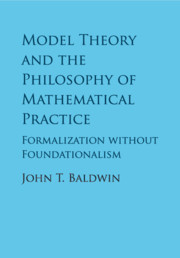PART II - THE PARADIGM SHIFT
Published online by Cambridge University Press: 19 January 2018
Summary
In a 1967 letter to Hao Wang, Gödel explained why others had missed his proof of the completeness theorem,
This blindness (or prejudice, or whatever you may call it) of logicians is indeed surprising. But I think the explanation is not hard to find. It lies in a widespread lack, at that time, of the required epistemological attitude towardmetamathematics and toward nonfinitary reasoning. …
I may add that my objectivist conception of mathematics and metamathematics in general, and of transfinite reasoning in particular, was fundamental also to my other work in logic.
As we'll see this ‘objectivist conception’, at least in the sense of envisioning models, is central to model theory. Part II traces the historical roots of the paradigmshift and then its effect on doing and organizing mathematics.We begin in Chapter 4 by seeing how the influence of Tarski and Malcev in the 1930s along with Robinson and Henkin almost 20 years later distinguished model theoretic concerns fromthose that prompted Gödel's work. Then we see the development of the tools of quantifier elimination,model completeness, indiscernibility, and interpretation in the 1950s. In Chapter 5, with Morley and Vaught, properties of theories such as Stone spaces, saturated models, and categoricity in power come to the forefront. We then discuss the key ingredient: Shelah's syntactic hierarchy with its dividing lines culminating in the main gap theorem, specifying which theories are classifiable. Zilber's trichotomy for combinatorial geometry highlights the interaction of model theory with other areas of mathematics. Chapter 6 demonstrates the role of formalization in sharpening the notion of tame and the consequent deep interaction of model theory and algebra. First order analysis moves the impact beyond algebra. An interlude in Chapter 7 considers some reasons for generalizing infinitary logic and the interaction of first order and infinitary logic including Vaught's conjecture. Chapter 8 recounts the role of the paradigm shift in the separation of set theory from first order model theory. We discuss such issues as the ‘identity of indiscernibles’ and Voevodsky's univalent type theory. We examine the relationship of model theory with both axiomatic and combinatorial set theory, seeing a greater entanglement of infinitary logic with axiomatic set theory.
- Type
- Chapter
- Information
- Model Theory and the Philosophy of Mathematical PracticeFormalization without Foundationalism, pp. 87 - 88Publisher: Cambridge University PressPrint publication year: 2018



